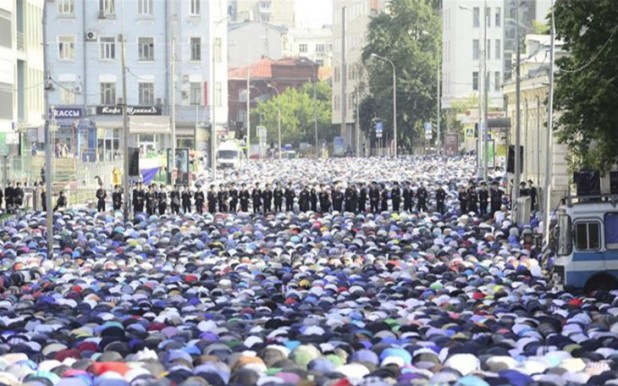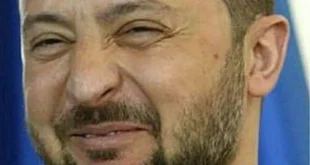The New Observer
April 2, 2016
Russian security forces have arrested eighteen ISIS terrorists in Moscow—all of them carrying Turkish identification documents and having entered the country from Uzbekistan.
The arrests highlight once again the danger posed by the European Union demands that Turks be allowed “free movement” within Europe.
Some of Moscow’s one million-strong Muslim population prays in the streets of Russia’s capital city.
The suspects were arrested by a joint raid of the domestic intelligence service FSB and the police, according to a report on the RIA Novosti news agency.
The men had been sent to Moscow in order to recruit new members for ISIS from the one million-strong—and growing—mixed-race Muslim population in Russia’s capital city.
Currently, Russia has some 20 million Muslims living within its borders, about 15 percent of the total population. The majority live in the Volga-Ural region and the Northern Caucasus, but both Moscow and St. Petersburg have significant Muslim populations.
Most of these Muslims are the mixed-race descendants dating from the time of the Islamic invasion of the Caucasus region after 641 AD, which spread further by the occupation of a large part of southern Russia by the Khanate of the Golden Horde and its successors.
These aliens were only driven out by a Russian counterattack starting in the sixteenth century, but many parts of the region—by now containing a significant mixed-race population—have remained Muslim to the present-day, and are the source of much trouble for present-day Russia, including ongoing terrorism.
According to the RIA Novosti report, the latest arrests had also uncovered a “large number of forged documents” which were “probably being supplied to IS recruits.”
These fake documents include Syrian passports and identification papers, similar to the ones used by the refugee-terrorists who attacked Paris and Brussels.
Muslim terrorism is also a major threat to Russian state security, with most of the attacks taking place in Chechnya and Dagestan.
There is even an official “Caucasus Emirate,” a militant jihadist organization active in southwestern Russia, whose openly declared intention is to expel Russians from the North Caucasus and to establish an independent Islamic emirate in the region.
Partially a successor to the secessionist Chechen Republic of Ichkeria, it was officially announced on October 7, 2007, by the former president of Ichkeria, Dokka Umarov, who became its first emir.
The Caucasus Emirate has fully adopted the Islamic fundamentalist ideology of Salafist-takfiri jihadism, whose enemies not only include Russia and its citizens, but all non-Muslims, including the local Sufi population, and foreign countries such as the United States, France, the United Kingdom, and Israel.
The Russian government has also banned seventeen Muslim terrorist organizations: the Highest Military Majlisul Shura of the United Forces of the Mujahedeen of the Caucasus, the Congress of the Peoples of Ichkeria and Daghestan, Al Qaeda, Asbat an-Ansar, Egyptian Islamic Jihad, Al-Jamaa al-Islami, Jamaat-e-Islami, Muslim Brotherhood, Hizb ut-Tahrir, Lashkar-e-Toiba, Taliban, Islamic Movement of Uzbekistan, Society of Social Reforms (Jamiat al-Islah al-Ijtimai), Society of the Revival of Islamic Heritage (Jamiat Ihya at-Turaz al-Islami), al-Haramain Foundation, Junj ash-Sham (Army of the Great Syria), and the Islamic Jihad — jamaat of the mujahedeen.
 Daily Stormer The Most Censored Publication in History
Daily Stormer The Most Censored Publication in History



